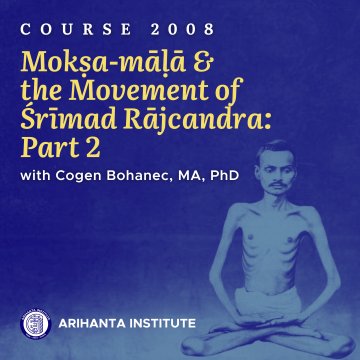Mokṣa-māḷā & the Movement of Śrīmad Rājcandra: Part 2


Mokṣa-māḷā & the Movement of Śrīmad Rājcandra: Part 2
Course 2008
As we have seen in the first half of this course, Śrīmad Rājcandra was an important Jain Saint of the late 19th and early 20th centuries who founded a
distinct and modern, yet also in many ways quite orthodox, movement of Jainism known as the Raj Bhakta Marg. In the first half of this course, we focused primarily on how Śrīmad Rājcandra’s (1867-1901) philosophy was informed by notable events in his life, and how in turn these events and this philosophy have influenced the development of the Raj Bhakta Marg. In the second half of this class we will examine the features of Śrīmad’s philosophy in greater depth based primarily on the writings of the Mokṣa-māḷā (1887), but occasionally examining his Ātma-siddhi Śāstra (1896) as well. Moreover, we will examine the central concept of guru bhakti and discuss the importance of understanding Jain bhakti both within Śrīmad’s thought and tradition,
but also within Jainism more broadly. We will closely examine how Śrīmad discussed various features of spiritual practice such as the importance of mantra recitation, sāmāyika and dhyāna meditation, and other practices intended to remove one’s karma and give one a direct experience of one’s spiritual essence. Finally, we will unpack the concise and elegant arguments that Śrīmad offers for the existence of an eternal soul—all discussions intended to both edify and inspire practitioners to dedicate themselves to an ardent spiritual practice where one might hope to attain self-realization and even liberation within 15 lifetimes—a significantly more attainable and immediate goal than what is often understood by many in the Jain tradition.
Learning Objectives:
- Read and reflect on the teachings of Śrīmad’s Mokṣa-māḷā regarding themes of self-realization, bhakti, religious practices, and philosophical discourses including logical proofs for the existence of a soul.
- Understand the importance of Śrīmad’s emphasis of attaining self-realization and liberation, and how this relates to understanding him as a reformer or a revivalist.
- Examining key features of bhakti, especially guru bhakti, in the Śrīmad tradition and how this might inform a broader understanding of the importance and role of bhakti in the Jain tradition more broadly.
- Examine key features of religious practice advocated by Śrīmad and widely practiced by his followers including mantra recitation, sāmāyika, dhyāna, and guru-bhakti.
- Take time to reflect on philosophical principles of Śrīmad and applicability into daily life.
- Inquire into the deeper meanings and implications of the Śrīmad’s teachings in dialogue with other Jain teachings and other religious traditions.
Course Details
• 10-hour self-study course. NOTE: This course is Part 2 of a 2-part course series as combined with course 2007 | Mokṣa-māḷā & the Movement of Śrīmad Rājcandra: Part 1.• Additional readings offered as support material.
• Professor available by appointment.
Learning Area
 Jain Philosophy, History & Anthropology
Jain Philosophy, History & Anthropology Instructor
 Cogen Bohanec, MA, PhD
Cogen Bohanec, MA, PhD Enrollment Options
14-DAY FREE TRIAL
- Free, unlimited access to our self-paced courses for 14-days.
- Already used your free trial? Enroll in our Monthly or Annual Membership options at anytime and continue learning immediately!
MONTHLY MEMBERSHIP
- $45 USD / Month
- Immediate access to course #### | Name.
- Unlimited access to our live and self-paced courses for one month, with month-to-month auto rollover.
- Excludes graduate seminars and language courses.

